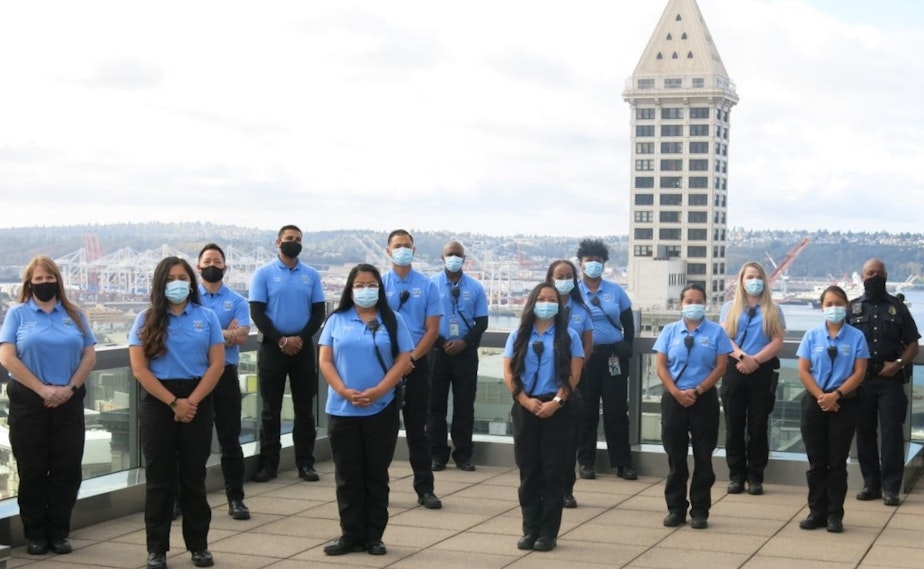Meet the Seattle Police Department's new community service officers

After years of planning, Seattle now has community service officers on the job. They’re a diverse, multi-lingual group with backgrounds in social services, courts, and law.
The Seattle Police Department says these unarmed civilians are meant to show a new kind of response to calls for service.
Mergitu Argo is one of the new community service officers. She helped gather community input as the program was being established — or reestablished. The old unit was eliminated 16 years ago.
Argo said people asked for officers who spoke multiple languages, and would be available on evenings and weekends. That led her to respond to a domestic violence call on a recent Sunday night.
“I was called to interpret for a DV victim,” Argo said. “The language is Oromo. I went over there not only as an interpreter but I was giving the victim resources where she can access to be safe from her abuser.”
'Unprecedented' number of officers leaving Seattle Police Department
Community service officers have been doing outreach for awhile, but in the last month they began responding to radio calls.
Sponsored
“We received a call for Spanish interpretation where there was an incident where two women had been fighting,” said Vicki Pinkham.
Sponsored
Pinkham and her partner community service officer went in once patrol officers said it was safe for them to do so. They were able to advise the women on mental health services and no-contact orders.
Pinkham said she’s worked in case management and coordinated a program on traditional Native American medicine at the University of Washington.
“A long time ago I used to work for the Department of Corrections in Oregon,” she said. “And the reason why I came to this position was things I’ve seen in the prison system. I felt like if I could change one person’s life, maybe that would be enough to put them on a different path.”
Prior to becoming a community service officer, Jagbir Atwal worked as a licensed legal intern focused on housing issues at the Northwest Justice Project. So he found himself taking on a recent landlord-tenant dispute.
“There was a lot of back and forth going on and that could have actually generated a police call, because when you’re trying to take someone out of their home, that’s a very high-stress situation,” he said.
Sponsored
Atwal said he helped mediate and explain the rights and resources for landlords and tenants.
Sponsored
Mia Mack used to work for Child Protective Services. She said she’s hoping to be on hand when police have to remove children from homes where they may be abused or neglected.
“If there is an incident where we can sit with the children, keep them comfortable — until either a social worker comes or whatever the officer decides, if they’re going to a relative — hopefully we can play a role with that,” she said.
Community service officers say one luxury they have that patrol officers might not is time — time to stay with someone and make sure they access the services they need. Supervisor Chris Inaba said he accompanied someone in distress on a recent call when the police officer had to leave the scene.
“I got on the radio and said I could assist, so I went out there and just stood by with the individual to make sure that they were able to safely onboard the sobering vehicle,” he said.
Community service officers
Sponsored
Community service officers are not armed. The uniform consists of light blue polo shirts, and officer Kevin Hendrix said they’re getting lots of questions.
Sponsored
“People will walk up to us ... because they’re not sure what we are,” he said. “They see 'Seattle Police,' but then they see 'CSO,' but then they don’t see a weapon. So they just walk up and start to ask, ‘What do you do?’”
Their launch comes amidst calls for police to better respond to low-level or non-criminal calls for service. Community service officer Krystal Bautista said she feels like she’s part of the solution police critics are seeking.
“Around the city we’ve been hearing this phrase, ‘reimagining policing ... reimagining public safety,’” she said. “And I think the community service officer program is here to do just that.”
Sergeant Kevin Nelson oversaw the launch of the new unit at the Seattle Police Department. He said when he joined the agency in 2002, the previous community service officers were still around, and always had answers to his questions.
He added that the new recruits will be a big help to patrol officers, who are racing from call to call. “I knew that this program would be able to help our officers on the street,” he said.
Sponsored
Nelson, who is Black, also explained that he had some negative encounters with police growing up. He said he wanted to help repair relationships with communities that have been historically mistreated by law enforcement.
"I’m not going to be part of the problem — I want to be part of the solution," he said.
He added that the community service officers are filling an important need, but their role is still in flux. “The community is going to have a big part in dictating what the [community service officers] will do in the future," he said.
Nelson said the program’s rollout comes at an uncertain time. It was initially touted as a tool to recruit more police officers — but now the city has a hiring freeze. Moreover, some community groups say the police department shouldn’t be doing this work at all — they want Seattle Police Department funds redirected to programs that they design, that will be independent of law enforcement.




